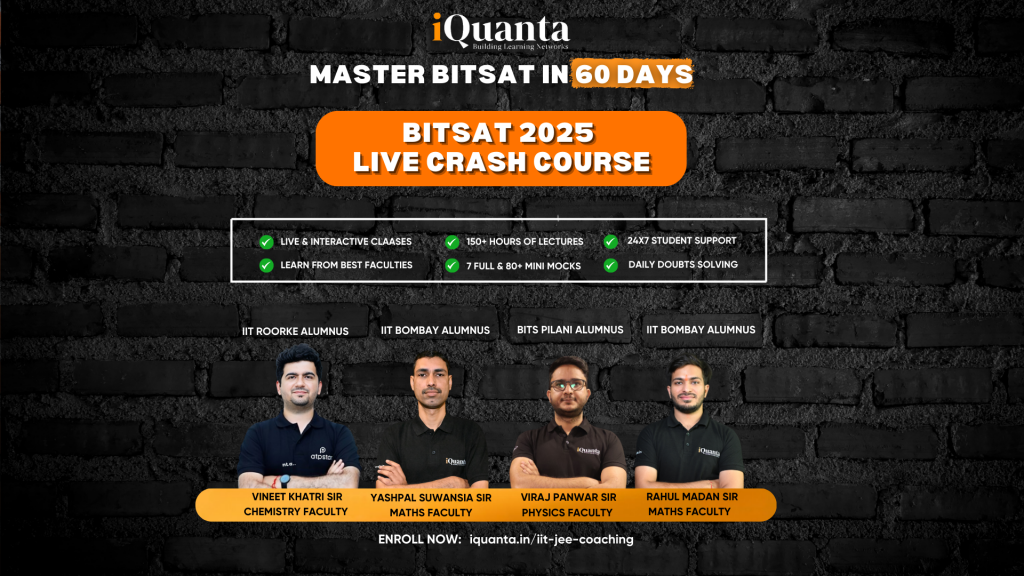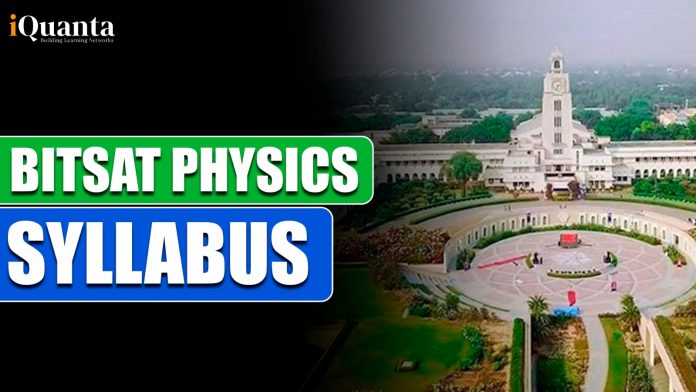BITSAT 2025 physics syllabus pdf has been released on the official website, bitsadmission.com. Candidates can now review the subjects, units, and topics they need to prepare for the entrance exam, including the BITSAT Physics syllabus 2025. It is recommended that candidates carefully examine the syllabus before starting the preparation. Important Physics topics include mechanics, electrostatics, magnetism, optics, modern physics, and more.
The syllabus includes topics from five subjects: Physics, Chemistry, Mathematics/Biology, English, and Logical Reasoning. For BPharma courses, candidates should focus on the biology section instead of mathematics. Candidates should also familiarise themselves with the official BITSAT 2025 exam pattern and syllabus.
BITSAT Physics Syllabus 2025
The BITSAT Physics syllabus 2025 outlines the key topics and concepts candidates need to study for the BITSAT entrance exam. It covers various units in Physics, ensuring a comprehensive preparation for the exam:
BITSAT Physics Syllabus 2025
| Topic | Subtopics |
| 1. Units & Measurement | – Different systems of units (SI, fundamental & derived units)- Dimensional analysis- Precision and significant figures- Fundamental measurements in Physics (Vernier calipers, screw gauge, physical balance) |
| 2. Kinematics | – Properties of vectors- Position, velocity, and acceleration vectors- Motion with constant acceleration- Projectile motion- Uniform circular motion- Relative motion |
| 3. Newton’s Laws of Motion | – Newton’s laws (free body diagram, resolution of forces)- Motion on an inclined plane- Motion of blocks with pulley systems- Circular motion – centripetal force- Inertial and non-inertial frames |
| 4. Impulse and Momentum | – Definition of impulse and momentum- Conservation of momentum- Collisions- Momentum of a system of particles- Center of mass |
| 5. Work and Energy | – Work done by a force- Kinetic energy and work-energy theorem- Power- Conservative forces and potential energy- Conservation of mechanical energy |
| 6. Rotational Motion | – Description of rotation (angular displacement, velocity, acceleration)- Rotational motion with constant angular acceleration- Moment of inertia, parallel and perpendicular axes theorems, rotational kinetic energy- Torque and angular momentum- Conservation of angular momentum- Rolling motion |
| 7. Gravitation | – Newton’s law of gravitation- Gravitational potential energy, escape velocity- Motion of planets – Kepler’s laws, satellite motion |
| 8. Mechanics of Solids and Fluids | – Elasticity- Pressure, density, and Archimedes’ principle- Viscosity and Surface Tension- Bernoulli’s theorem |
| 9. Oscillations | – Kinematics of simple harmonic motion- Spring mass system, simple and compound pendulum- Forced & damped oscillations, resonance |
| 10. Waves | – Progressive sinusoidal waves- Standing waves in strings and pipes- Superposition of waves, beats- Doppler Effect |
| 11. Heat and Thermodynamics | – Kinetic theory of gases- Thermal equilibrium and temperature- Specific heat, Heat Transfer – Conduction, convection and radiation, thermal conductivity- Newton’s law of cooling, work, heat, and the first law of thermodynamics- 2nd law of thermodynamics, Carnot engine – Efficiency and Coefficient of performance |
| 12. Electrostatics | – Coulomb’s law- Electric field (discrete and continuous charge distributions)- Electrostatic potential and Electrostatic potential energy- Gauss’ law and its applications- Electric dipole- Capacitance and dielectrics (parallel plate capacitor, capacitors in series and parallel) |
| 13. Current Electricity | – Ohm’s law, Joule heating- D.C circuits – Resistors and cells in series and parallel, Kirchoff’s laws, potentiometer- Wheatstone bridge- Electrical Resistance (Resistivity, origin and temperature dependence of resistivity) |
| 14. Magnetic Effect of Current | – Biot-Savart’s law and its applications- Ampere’s law and its applications- Lorentz force, force on current-carrying conductors in a magnetic field- Magnetic moment of a current loop, torque on a current loop, Galvanometer and its conversion |
| 15. Electromagnetic Induction | – Faraday’s law, Lenz’s law, eddy currents- Self and mutual inductance- Transformers and generators- Alternating current (peak and rms value)- AC circuits, LCR circuits |
| 16. Optics | – Laws of reflection and refraction- Lenses and mirrors- Optical instruments – telescope and microscope- Interference – Huygen’s principle, Young’s double slit experiment- Interference in thin films- Diffraction due to a single slit- Electromagnetic waves and their characteristics (qualitative ideas), electromagnetic spectrum- Polarization – states of polarization, Malus’ law, Brewster’s law |
| 17. Modern Physics | – Dual nature of light and matter – Photoelectric effect, De Broglie wavelength- Atomic models – Rutherford’s experiment, Bohr’s atomic model- Hydrogen atom spectrum- Radioactivity- Nuclear reactions: Fission and fusion, binding energy |
| 18. Electronic Devices | – Energy bands in solids (qualitative ideas), conductors, insulators, and semiconductors- Semiconductor diode – I-V characteristics in forward and reverse bias, diode as a rectifier- I-V characteristics of LED, photodiode, solar cell, and Zener diode- Zener diode as a voltage regulator- Junction transistor, transistor action, characteristics of a transistor- Transistor as an amplifier (common emitter configuration) and oscillator- Logic gates (OR, AND, NOT, NAND, NOR), Transistor as a switch |
Join the BITSAT Course by iQuanta

Best Books for BITSAT Physics Syllabus 2025
For candidates preparing for BITSAT 2025, understanding the core concepts and practicing a wide range of problems is important for scoring well in the Physics section. The following books are highly recommended for building a strong foundation and enhancing problem-solving skills in Physics:
Best Books for BITSAT Physics 2025
| Book Title | Description |
| Concepts of Physics by HC Verma (Vol I & Vol II) | A classic in Physics, offering clear explanations of fundamental concepts and a wide range of problems to practice. Ideal for building strong conceptual understanding and improving problem-solving techniques. |
| Problems in General Physics by IE Irodov | Known for its challenging problems, this book is perfect for students looking to test and expand their knowledge beyond basic concepts. Great for advanced problem-solving practice. |
| Arihant Physics by DC Pandey | Combines theory and practice problems for all Physics topics. With concise explanations and exercises ranging from basic to advanced, it’s a comprehensive resource for preparation. |
| Advanced Level Physics by Nelson and Parker | Renowned for its in-depth content, this book is ideal for students who want to dive deeper into Physics concepts and tackle complex problems. |
| Fundamentals of Physics by Resnick, Halliday, Walker | A renowned and thorough resource covering almost all fundamental Physics topics. Excellent for understanding both theoretical and practical concepts in detail. |
Join the BITSAT Course by iQuanta

Important Topics in BITSAT 2025 Physics
Given below are some of the important topics in BITSAT 2025 physics, along with their approximate weightage, to help you prepare better:
Important Physics Topics in BITSAT
| Topic | Subtopics | Approximate Weightage |
| Mechanics | Laws of Motion, Work and Energy, Rotational Motion | 20-25% |
| Electrostatics | Coulomb’s Law, Electric Field, Gauss’s Law, Capacitance | 10-15% |
| Magnetism | Magnetic Effect of Current, Ampere’s Law, Lorentz Force | 10-12% |
| Optics | Lenses, Mirrors, Interference, Diffraction | 8-10% |
| Modern Physics | Photoelectric Effect, Atomic Models, Radioactivity | 12-15% |
| Thermodynamics and Heat | Laws of Thermodynamics, Kinetic Theory of Gases, Heat Transfer | 10-12% |
BITSAT Physics FAQs – Frequently Asked Questions
The Physics level in BITSAT 2025 is moderately challenging. It focuses on concepts from the JEE Main and 12th-grade syllabus. The test tests understanding of fundamental principles, problem-solving skills, and application of concepts in topics like Mechanics, Electricity, Magnetism, Optics, and Modern Physics. It requires a thorough grasp of key concepts.
The BITSAT 2025 syllabus is now available on bitsadmission.com, covering topics in Physics, Chemistry, Mathematics, English Proficiency, and Logical Reasoning for comprehensive exam preparation.
A competitive BITSAT score depends on the institute’s branch. For the leading branches, students should aim for scores between 370 and 380.
To secure admission to the Bachelor of Engineering (BE) course at the BITS Pilani campus, candidates must score between 270 and 340 marks.
NCERT textbooks provide a solid foundation for BITSAT preparation, but it’s important to supplement them with additional resources to practice application-oriented questions.
Join the BITSAT Course by iQuanta





